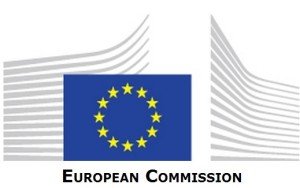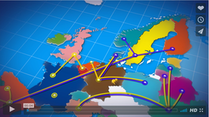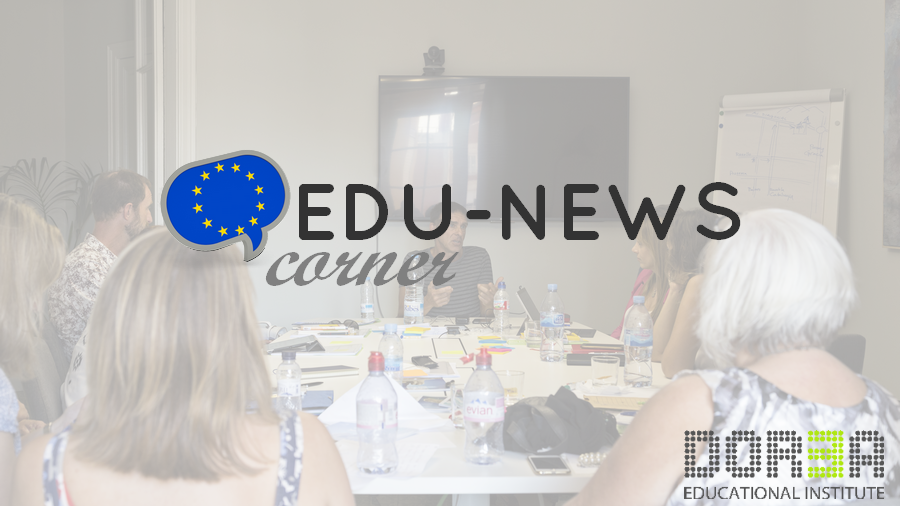Weekly Roundup
 EPALE focus: Adult literacy
EPALE focus: Adult literacy
In honor of International Literacy Day (08.09.2017), EPALE is dedicating the month of September to adult literacy.
In the EU there are currently 55 million adults aged 16-65 with literacy difficulties. Increasing the literacy levels in Europe would help these adults to:
- become better integrated into society
- find a better-paid and more stable job
- reduce their risk of numerous illnesses
- improve their family life
- reduce their risk of committing crime.
Check out EPALE’s thematic page Basic skills where the community and the national teams have gathered interesting articles, useful resources and case studies on the topic.
 Literacy and the Upskilling Pathways initiative
Literacy and the Upskilling Pathways initiative
EPALE Thematic Coordinator, Andrew McCoshan, takes a look at the questions we need to consider when we think about literacy in the context of the EU Upskilling Pathways initiative.
Low levels of literacy are one of the major basic skills that the EU’s Upskilling Pathways initiative has been designed to address. It is therefore worth thinking about what literacy means across the different components of the programme. For more information please click here.
 What is ‘literacy’?
What is ‘literacy’?
The first question that will be addressed in EPALE’s September discussion on adult literacy is what we actually mean when we talk about literacy. The English word ‘literacy’ has a simple definition – the ability to read and write – and yet its precise meaning is subject to endless debate, not least in European projects, as literacy does not have a direct translation in many languages.
You can read more about its meaning by clicking here.
 Promoting literacy for low-skilled adults in Southeast Europe and the implication of learning partnerships
Promoting literacy for low-skilled adults in Southeast Europe and the implication of learning partnerships
Most Southeast European countries have low favourable conditions for increasing participation in adults in learning. The majority of them face – not necessarily for the same reasons – major barriers to implementing policies to increase the number of adult learners. These barriers generally appear at all levels of adult education, but the most significant ones are those in literacy programmes for the low skilled.
Therefore, this subject requires more attention and about how it is planned to be given you can read here.
 Improving employment support for people with lived experience of Mental Health Illness
Improving employment support for people with lived experience of Mental Health Illness
Equil is an Erasmus+ Strategic Partnership project running 2 years, which will develop training and learning resources which support the professional development of both new and existing Employment Practitioners, Educators, Employers and people with lived experience of Mental Ill Health.
Project partners come from 5 European countries: CESIE in Italy, MhtConsult in Denmark, Accion Laboral in Spain Zorgvragersorganisatie GGZ Midden Holland in The Netherlands and Mersey Care NHS Trust and Merseyside Expanding Horizons in the UK.
More information you can find here.
 The Advenus project – open access resources for adult refugees
The Advenus project – open access resources for adult refugees
The Advenus project aims to improve and extend the offer of high quality, culturally sensitive open access e-learning resources to adult refugees, and their trainers and teachers in EU countries.
Five open access courses are offered, translated into five different languages. This is the result of an international research collaboration between INN University of Applied Sciences in Norway (coordinator), LUMSA University in Italy, the University of PORTO in Portugal, and Community Development Institute in Macedonia. Advenus is funded by the EU and Erasmus+.
For more information on Advenus, please get in touch on www.advenus.net
 Apprenticeships abroad: Commission gives boost to long-term placements across the EU
Apprenticeships abroad: Commission gives boost to long-term placements across the EU
The European Commission is pre-financing seven pilot projects that offer long-term apprenticeships abroad.
The aim of these projects is to test experiment placements of at least 6 months, in an effort to promote apprenticeships abroad of a longer duration.
Commissioner for Employment, Social Affairs, Skills and Labour Mobility, Marianne Thyssen, commented: “Evidence has shown that long-term mobility experiences improve social, job-specific and language skills – much more than short-term stays abroad. Contrary to university students participating in year-long programmes like Erasmus, however, the vast majority of Vocational Education and Training learners tend to go abroad for rather short periods. This is why we are creating more long-term opportunities, which will ultimately increase their chances on the job market. With these pilot projects and our new ErasmusPro initiative, we expect to mobilise up to 50,000 long-term mobility opportunities for VET learners by 2020.”
For more information click here.
 eTwinning presents the videos of this year’s winning projects
eTwinning presents the videos of this year’s winning projects
Summer Holidays are over and eTwinning is kicking off the new school year with a wide range of new developments for the community. eTwinning is happy to officially release the project videos for the three winning projects of the 2017 European eTwinning Prizes; the videos highlight the very best in collaboration between teachers from different countries and the common efforts of their pupils.
This year, the three winning projects are “In Darwin’s steps”, “Migrants and Refugees” and “EU Games 2015-2016”. Through these videos, you can follow the story behind each winning project, hear from pupils involved and get inspiration and fresh ideas for your projects.
Click here to watch the videos on eTwinning’s freshly revamped YouTube channel.
 Debate on the State of the Union
Debate on the State of the Union
Security, migration, employment, climate change… What will be Europe’s priorities for the year to come?
The State of the European Union is an annual speech and debate during which the members of Parliament review the European Commission’s achievements over the past year as well as assess its objectives for the year to come. Once the Commission President finishes his speech, there is an open debate with the members of Parliament.
The State of the Union is about ensuring transparency as well as political accountability. The debate takes place every year during the first plenary session of September.
Follow the State of the Union debate on the European Parliament facebook page on 13th of September to learn more! #SOTEU
 LIVE! The conference for adult educators on 29th September focuses on the development of adult educators’ skills
LIVE! The conference for adult educators on 29th September focuses on the development of adult educators’ skills
The changing world poses a number of challenges for adult educators. Social change, the redefining of social values, and opportunities and problems related to digital availability and networking, are some of the challenges that require adult educators to obtain a number of new skills.
This conference focuses on the development of adult educators’ skills while developing cooperation within Estonia and around the EU.
The conference is part of European Social Fund “Promoting adult education and expanding learning opportunities and is free of charge. The conference is part of Estonian Presidency of the Council of the European Union.
Watch a live stream of the conference at EPALE on 29th September!
 A new publication of UNESCO “Reading the past, writing the future: Fifty years of promoting Literacy”
A new publication of UNESCO “Reading the past, writing the future: Fifty years of promoting Literacy”
A new publication of UNESCO “Reading the past, writing the future: Fifty years of promoting Literacy” is now available online. This publication takes stock of youth and adult literacy interventions which have been implemented since 1966, when UNESCO held its first International Literacy Day. It sheds light on the literacy-related challenges the world is now facing, as it embarks on the implementation of the2030 Sustainable Development Agenda.
The publication is available online here.
 2017 VET Research Awards: Send your nominations
2017 VET Research Awards: Send your nominations
During the European Vocational Skills Week (20-24 November 2017) the European Commission will award outstanding research projects in vocational education and training (VET).
The VET Research Award aims to reward a VET research project or an individual researcher who has made an outstanding contribution to innovative thinking in VET, including initial and higher VET, continuing VET, and career-long professional learning.
The call for proposals and the nomination process are managed by the European Research Network in Vocational Education and Training (link is external) (VETNET). VET researchers and other VET professionals are invited to put forward their nominations for the VET Research Award. Travel and accommodation costs for the Award Winner will be covered by the European Commission.
The deadline for applications is 15 September 2017, 23:59 CEST.
Learn about the call for proposals here.
Prepared by Emilija Ardzevičiūtė

